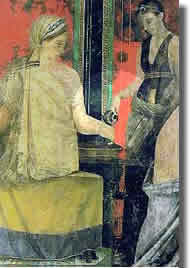
 |
|||||||||||||||||||||||||||||||||||||||||||||||||||||||||||||
| home
> pagan
origins > virgin birth |
|
||||||||||||||||||||||||||||||||||||||||||||||||||||||||
| Jesus had a mortal mother and a divine father -- Pagan Gods did that first |

|
According to one story, the Roman Emperor Augustus's mother was worshipping in the temple of Apollo when she fell asleep and was impregnated by the god [Suetonius Lives of the Caesars: Augustus 94]
|
|||||||||||||
Pausanias describes the birth of the God Attis:
|
a daughter of the river Sangarius, they say, took of the fruit and laid it in her bosom, when it at once disappeared, but she was with child. A boy was born, and exposed, but was tended by a he-goat. [Pausanias, Description of Greece 7.17.9-11] |
The second century Church Father Origen says of the Jesus' virgin birth, He lists a number of Pagan Gods born of virgins: Danae, Melanippe, Auge and Antiope. The stories about these Gods are "ancient," says Origin, but unlike the story of Jesus' virgin birth, only fables. [Origin, Against Celsus 1, 37] |
"We [Christians] are not the only persons who have recourse to miraculous narratives of this kind." [Origin, Against Celsus 1, 37] |
The second century Christian Justin Martyr says of Jesus, |
"He was born of a virgin, accept this in common with what you believe of Perseus." [Justin Martyr, First Apology, 22] |
| Why did these virgin born Gods come before Jesus? Justin knew the answer -- devils. | "The devils...craftily feigned that Minerva was the daughter of Jupiter not by sexual union." [Justin Martyr, First Apology, 64] |
POCM is about history, not ethics. Jesus' miraculous conception was not new and unique -- that's important for the historical truth, or not, of gospel claims. Other people take the point farther, and ask: "Can we morally say: "Ours is history, yours in a lie"? Here's how Mrs. Crossan's little boy Johnny put's it: |
Augustus came from a miraculous conception by the divine and human conjunction of [the God] Apollo and [his mother] Atia. How does the historian respond to that story? Are there any who take it literally?... That divergence raises an ethical problem for me. Either all such divine conceptions, from Alexander to Augusts and from the Christ to the Buddha, should be accepted literally and miraculously or all of them should be accepted metaphorically and theologically. It is not morally acceptable to say...our story is truth but yours is myth; ours is history but yours is a lie. It is even less morally acceptable to say that indirectly and covertly by manufacturing defensive or protective strategies that apply only to one's own story. [John Crosssan, The Birth of Christianity, 1998, pg 28 - 29.]
|
| I'm
still working on this page
|